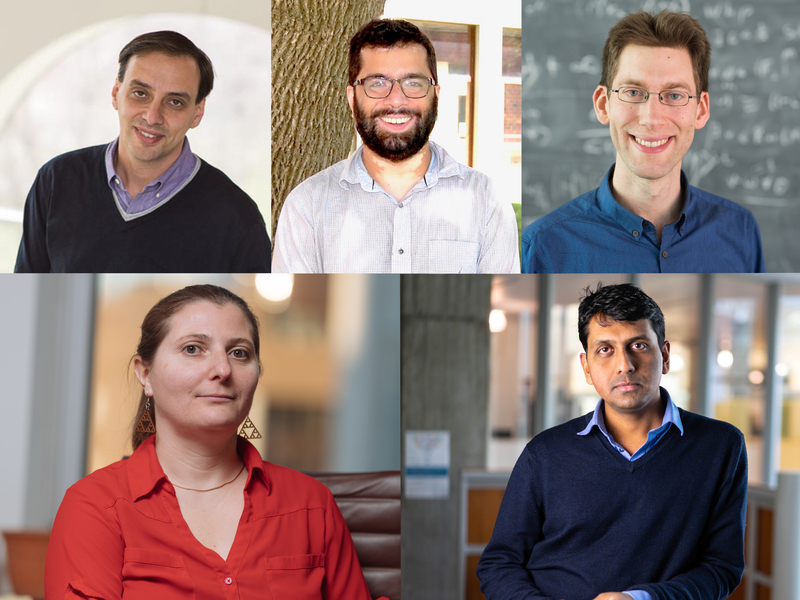
Clockwise, from top left: Leonid Mirny, Davesh Maulik, Aram Harrow, Vinod Vaikuntanathan, and Virginia Vassilevska Williams.
Credits:
Photos: Top row courtesy of the departments of Mathematics and Physics. Bottom row: Courtesy of Jared Charney (left) and Lillie Paquette.
The program supports “outstanding theoretical scientists.”
Sandi Miller | Jane Halpern | Department of Mathematics | Department of Physics | Department of Electrical Engineering and Computer Science
Five MIT professors have been selected to receive the 2023 Simons Investigators awards from the Simons Foundation. Virginia Vassilevska Williams and Vinod Vaikuntanathan are both professors in MIT’s Department of Electrical Engineering and Computer Science (EECS) and principal investigators in MIT’s Computer Science and Artificial Intelligence Laboratory (CSAIL). Aram Harrow and Leonid Mirny are professors in the Department of Physics, and Davesh Maulik is a professor in the Department of Mathematics.
The Simons Investigator program supports “outstanding theoretical scientists who receive a stable base of research support from the foundation, enabling them to undertake the long-term study of fundamental questions.”
Aram Harrow '01, PhD '05, professor of physics, studies theoretical quantum information science in order to understand the capabilities of quantum computers and quantum communication devices. Harrow has developed quantum algorithms for solving large systems of linear equations and hybrid classical-quantum algorithms for machine learning, and has also contributed to the intersection of quantum information and many-body physics, with work on thermalization, random quantum dynamics, and the “monogamy” property of quantum entanglement. He was a lecturer at the University of Bristol and a research assistant professor at the University of Washington until joining MIT in 2013. His awards include the NSF CAREER award, several best paper awards, an APS Outstanding Referee Award, and the APS Rolf Landauer and Charles H Bennett Award in Quantum Computing.
Davesh Maulik joined the Department of Mathematics at MIT in 2015. He works in algebraic geometry, with an emphasis on the geometry of moduli spaces. In many cases, this involves using ideas from neighboring fields such as representation theory, symplectic geometry, and number theory. His most recent work has focused on moduli spaces of Higgs bundles and various conjectures regarding their structure. In the past, he has received a Clay Mathematics Research Fellowship and the Compositio Mathematica Prize with coauthors for an outstanding research publication.
Leonid A. Mirny, the Richard J. Cohen (1976) Professor in Medicine and Biomedical Physics, is a core faculty member at the Institute for Medical Engineering and Science (IMES), a member of the faculty at the Department of Physics, and is an HST faculty member. His work combines biophysical modeling with analysis of large genomics data to address fundamental problems in biology. Mirny aims to understand how exceedingly long molecules of DNA are folded in 3D, and how this 3D folding of the genome influences gene expression and execution of genetic programs in health and disease. His prediction that the genome is folded by a new class of motors that act by “loop extrusion” was experimentally confirmed, leading a paradigm shift in chromosome biology. Broadly, Mirny is interested in unraveling physical mechanisms that underlie reading, writing, and transmission of genetic and epigenetic information. He was awarded the 2019 Blaise Pascal International Chair of Excellence and was named a Fellow of the American Physical Society. He received his MS in chemistry from the Weizmann Institute of Science, and his PhD in biophysics from Harvard University, where he also served as a junior fellow at Harvard Society of Fellows.
Vinod Vaikuntanathan is a professor of computer science at MIT. The co-inventor of modern fully homomorphic encryption systems and many other lattice-based (and post-quantum secure) cryptographic primitives, Vaikuntanathan’s work has been recognized with a George M. Sprowls PhD thesis award, an IBM Josef Raviv Fellowship, a Sloan Faculty Fellowship, a Microsoft Faculty Fellowship, an NSF CAREER Award, a DARPA Young Faculty Award, a Harold E. Edgerton Faculty Award, Test of Time awards from IEEE FOCS and CRYPTO conferences, and a Gödel prize. Vaikuntanathan earned his SM and PhD degrees from MIT, and a BTech degree from the Indian Institute of Technology Madras.
Virginia Vassilevska Williams is a professor of computer science at MIT EECS. Williams’s research focuses on algorithm design and analysis of fundamental problems involving graphs, matrices and more, seeking to determine the precise (asymptotic) time complexity of these problems. She has designed the fastest algorithm for matrix multiplication and is widely regarded as the leading expert on fine-grained complexity. Among her many awards, she has received an NSF CAREER award; a Sloan Research Fellowship; a Google Faculty Research Award, a Thornton Family Faculty Research Innovation Fellowship (FRIF), and was an invited speaker at the International Congress of Mathematicians in 2018. Williams earned her MS and PhD degrees at Carnegie Mellon University, and her BS degree at Caltech.
* Originally published in MIT News.